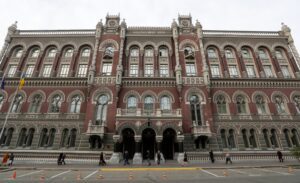
English ex-footballer David Beckham and his wife, Victoria, have made a donation to help Ukrainian children, the footballer said.
“Mothers are forced to flee with their children. Families are separating… The war in Ukraine has been going on for the second week, the needs of families are great, and 7.5 million children are now at risk … Victoria and I donated on behalf of our family to the @UNICEF 7 Fund Emergency Appeal,” Beckham said video message on Instagram on Tuesday and called on everyone to provide immediate assistance.
“The situation in Ukraine is truly heartbreaking. Please consider making a donation to the @UNICEF 7 Fund Emergency Appeal, if you have the opportunity, to provide immediate assistance to support the well-being of children, to help with medication and to provide a safe place for families,” Victoria wrote on Instagram.

During the period of Russian military aggression, Ukraine should allow the import and sale of fuel of the Euro-4 ecological standard, director of the A-95 consulting group Serhiy Kuyun said.
“It is necessary to temporarily allow the use of fuel of Euro-4 standards. The equipment of the Armed Forces of Ukraine will not notice this at all. Tanks, ZILs, diesel locomotives and others will go easily – this equipment is not new for the most part,” he wrote on his Facebook page.
“Civilian transport will also survive. Strict European fuel requirements are mainly for environmental purposes. Now there are much more serious threats to our life and health than the exhaust in traffic jams from refugees’ cars,” Kuyun said.
According to him, there are interesting price offers for Euro-4 on the foreign market, which will increase the filling of the Ukrainian market with fuel.

Ukrainian athletes won two more medals at the Beijing 2022 Paralympics.
“The fifth day of the Winter Paralympic Games in Beijing brought Ukraine two medals. They were won in different classes of freestyle sprint skiing,” the National Olympic Committee said in a statement.
Oksana Shyshkova, performing among visually impaired athletes (guide Andriy Marchenko), has already won her second silver and fourth prize at this Paralympics.
Hryhoriy Vovchynsky has already collected a full set of medals in Beijing 2022, and he added bronze in cross-country skiing to gold and silver in biathlon.
In total, Ukraine’s national team has already won 19 medals: six gold, eight silver, five bronze, and ranks third in the medal standings, behind China and Canada.

The National Bank of Ukraine (NBU) continued to gradually loosen and clarify the restrictions on the foreign exchange market, introduced on February 24, in order to ensure the reliable and stable functioning of the country’s financial system in connection with the introduction of martial law, the regulator said on its website on Tuesday.
According to it, from March 8, 2022, the National Bank allowed clients in territories under the threat of occupation by Russia to withdraw cash in national and foreign currency from accounts without limits on the amount, as well as to purchase cash currency and bank metals with physical delivery if they are available in bank branch.
The NBU clarified that the decision to carry out such transactions is made by the head of the bank and can be delegated to the head of the branch of the bank.
The National Bank noted that the issuance of bank metals from the accounts of bank customers is carried out without restrictions within their balance on the account and if they are available at the cash desk of a branch.
The regulator also again expanded the exceptions to the ban on transactions from the accounts of residents of Russia or Belarus and legal entities which ultimate beneficiaries are residents of the Russian Federation or the Republic of Belarus. If earlier it was possible to pay from them in support of the Ukrainian army to the account of the National Bank and to the accounts of the Cabinet of Ministers and ministries, now social payments, salary payments, utilities, taxes, fees and other obligatory payments.
In addition, the NBU has expanded the opportunity for residents and non-residents to make transfers to the accounts of charitable foundations not only in hryvnia, but also in foreign currency. This applies to charitable foundations created to promote the country’s defense capability and mobilization readiness, support for the Armed Forces of Ukraine and territorial defense, social protection, healthcare and other topical issues of protecting the population under martial law.
The National Bank also provided an opportunity for banks to open accounts for military personnel and carry out their identification and verification using a military ID.
In addition, it was clarified that settlements under documentary and standby letters of credit/guarantees/counter-guarantees opened (confirmed, granted) since February 24, 2022 are prohibited. An exception is made only for cases when such settlements are made to pay for critical import goods, settlements with IFOs and other special operations of bank customers permitted by the NBU.
The National Bank emphasized that this ban does not apply to settlements under documentary and standby letters of credit/guarantees/counter-guarantees opened (confirmed, provided) until February 23, 2022 inclusive.
The National Bank also determined that in case of receipt of funds from abroad in Russian or Belarusian rubles for export/import of goods, banks are allowed to exchange these funds on the international currency market for another currency for its subsequent crediting to the client’s accounts.
The relevant changes were made by Resolution of the National Bank Board of March 8, No. 44 on amendments to Resolution of the NBU Board of February 24, 2022, No. 18, which comes into force on March 8, 2022.

The Volkswagen auto concern has forced to suspend the production of cars at several factories in Germany due to the cessation of supplies of components from Ukraine after the start of Russian military aggression.
According to the Wall Street Journal, the automaker has created a working group whose task is to assess the risks and find ways to ensure the uninterrupted production of cars.
The largest Volkswagen plant in Wolfsburg is operating normally this week, however, according to the concern’s forecasts, car production will have to be reduced next week, and production will be completely stopped in another week.
Supply disruptions will also affect the work of the Hannover truck plant and enterprises that produce auto parts.
Earlier, Volkswagen had to suspend the work of enterprises in Dresden, as well as in Zwickau, where electric vehicles are produced, in particular, the ID.4 model exported to the United States.

Families with children who wish to receive a monetized form of one-time assistance “baby package” can spend funds on any necessary goods and purposes without restrictions, Commissioner for Human Rights of the Verkhovna Rada Liudmyla Denisova said.
The relevant changes were approved by the Resolution of the Cabinet of Ministers of Ukraine on 03/05/2022. No. 204.
According to the document, from now on it is not necessary to open a special account for accruing such funds, it is enough to indicate any active account with JSC CB Privatbank.
Funds can be used to purchase medicines, food, fuel, etc. during the period of martial law and a month after its end.